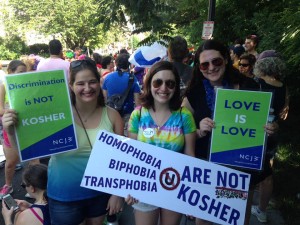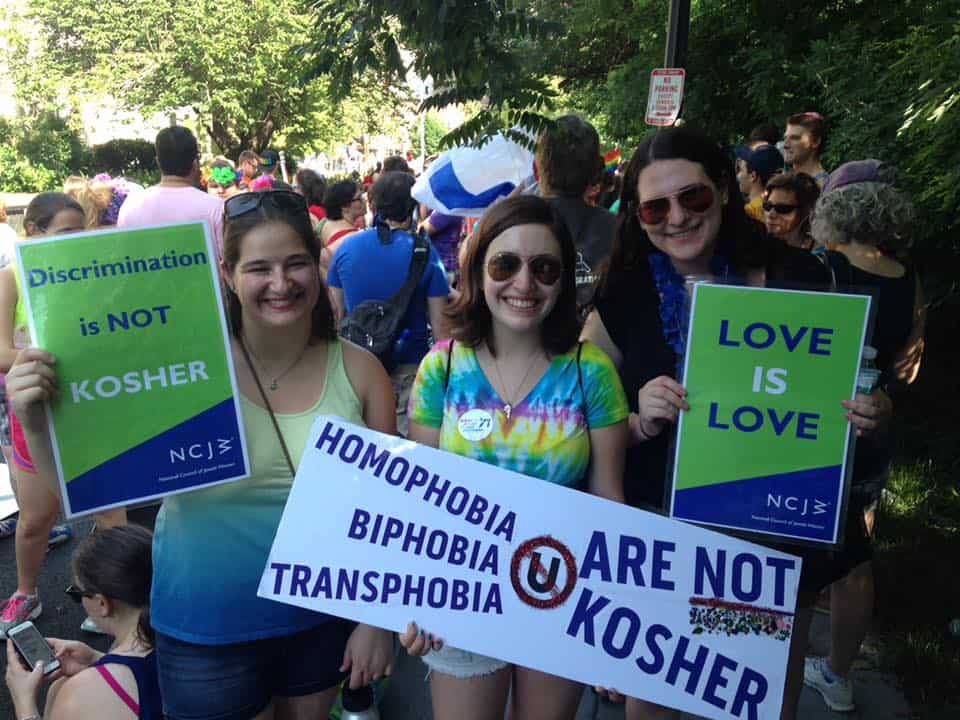 On the Sunday morning following the Capital Pride Parade in Washington, D.C., I slept in and woke up with glitter still on my face. Stickers and handouts I had collected while I marched with National Council of Jewish Women and the Religious Action Center of Reform Judaism at the festivities were scattered around my room.
On the Sunday morning following the Capital Pride Parade in Washington, D.C., I slept in and woke up with glitter still on my face. Stickers and handouts I had collected while I marched with National Council of Jewish Women and the Religious Action Center of Reform Judaism at the festivities were scattered around my room.
My afterglow from this celebration of the lesbian, gay, bisexual, transgender, gender nonconforming, queer and questioning (LGBTQ) community was cut short as soon as I turned on my phone. When I first saw the news, the Washington Post was reporting 20 dead in an Orlando gay nightclub; by the time I had gotten out of bed and made breakfast, the number had risen to 49 dead and 53 wounded, making it the deadliest mass shooting in American history. Numb with shock, I thought back to the rainbow-filled and joyous celebration that had taken place just the day before. Unable to process the horror of this shooting, I did what most people of my generation tend to do: I posted my thoughts on Facebook, concluding with the line, “Praying for the victims and their families.”
What followed was the loudest, rawest outcry against religion that I have ever seen on social media. Dozens of posts filled my newsfeed with messages such as, “Please, keep your prayers,” and “Prayers won’t do anything to stop homophobia and gun violence.”
My Facebook friends were not unique in their outrage. On Monday, June 13, some members of the House of Representatives made waves when they protested a moment of silence for the victims of the Orlando massacre. In an interview that Monday, Rep. Jim Himes (D-CT) expressed his frustration: “‘Thoughts and prayers’ are three words that cost you nothing. I’m sick of it. Show some courage.”
I understand Rep. Himes’ and others’ frustration. Words, social media posts, and moments of silence can be empty, especially when those expressing their sympathies have not previously moved on issues of gun violence and LGBTQ justice.
Yet, I was surprised by this response, because I have a different understanding of prayer. As an intern at NCJW, my social justice work is guided by Judaism, and I cannot separate the two. When I say that I am praying, I mean that I am ready to take action. In the voting rights march from Selma to Montgomery in 1965, Jewish theologian Rabbi Abraham Joshua Heschel famously reflected, “When I marched in Selma, my feet were praying.” To me—and in my experience, to many other Jews—praying with my feet and working for tikkun olam, or repairing the world, is the only way to effectively pray.
On Wednesday, June 15, I saw that leaders in the Senate began to pray effectively with their filibuster to address gun violence. Showing courage, and interrupting the regular business of the Senate, they turned thoughts and prayers for the victims of the Orlando massacre into action. Religion and prayer can be a source of healing and comfort after yet another instance of gun violence and a hate crime against the Latino and LGBTQ communities. Prayer becomes problematic when it is used as an excuse for complacency. Instead, we should follow the lead of the members of Congress who spoke out and stood on the Senate floor for nearly 15 hours. We cannot pray away the violence and hate in our world with mere thoughts alone; instead, our prayer must incite us to action, lead us to march in the streets, and do the holy work of advocating for justice for all.
Join me in praying through action for the victims and families of the Orlando shooting, and for all LGBTQ members of our communities. Here are some ways to take action:
• Tell your lawmakers to co-sponsor the Equality Act to ensure federal protection against discrimination for every individual regardless of sexual orientation, gender or gender identity.
• Learn more and educate your community about the Equality Act and the positive impact it would have for LGBTQ individuals, using NCJW’s talking points and frequently asked questions at www.ncjw.org.
• Find more resources for ways to respond in the wake of the shooting in Orlando at www.Keshetonline.org.
Madeline Budman is a member of Ohef Sholom Temple and a student at Georgetown University. This blog post first appeared on the National Council of Jewish Women’s website.
Madeline Budman,
NCJW Legislative Intern

